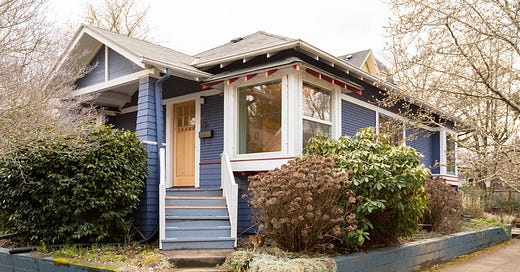Home renovations: cost or investment?
This post: ways to think about the cost of "improving" your house. (FYI: I moved the SOFF newsletter to Substack and changed the title to Douglas' Money and Meaning)
I have a couple of friends contemplating home renovations, in the order of $50,000-$90,000. This brought up an interesting question: how do we look at home renovations? Are they operations and maintenance, investing in the value of your home, or just another form of bourgeois consumption?
Operations and maintenance? One of my friends has a gas furnace, installed in 1997, which she wants to replace. The lifespan of a furnace is about 15-20 years so it’s probably about time. A couple of thoughts: you’re supposed to create a reserve of 1-3% of the value of your house for O&M, so in theory, she has saved 25 years to pay for this new furnace already. Needless to say, most people don’t, so big expenses like the furnace, or a new roof (I need one!) become big surprise expenses. That’s a combination of bad planning and wishful thinking. Isabel Wilkerson in the book Caste writes “Ignorance is no protection from the consequences of inaction.” And delaying O&M usually means worse problems in the future (my roof!).
“Ignorance is no protection from the consequences of inaction” - Isabel Wilkerson
At the same time, she wants to make improvements, mostly importantly, air conditioning. So know we have to think about how to assess home improvements.
Investing in the value of your house? Portland has gotten noticably hotter since my friend bought her house in 1994. Back in the 1990s, people didn’t need air conditioning. But global warming means a future where my friend wants air conditioning in her house. Will adding it increase the value of her home?
I’ve seen many homeowners justify home improvements with “we’ll get it back when we sell the house.” I find most homeowners use investment language to justify consumption. But it’s wishful thinking without any real analysis. It’s very easy to look to see which home improvements have the highest ROI. The vast majority cost more to do than add value to your home. The one exception I can think of: I added a basement unit in my house, which produces income, which paid for the renovations after 3 years and created profit thereafter. So if you really want to increase the value of your home, does the renovation produce income?
Even if the renovation increases the value of your home, remember that the equity is locked into your house now. You’ve converted cash, which is liquid (easily converted into other things) into value locked into the value of your house.
Bottom line: If you want to improve your home because you want to live in a “better” home, like adding air conditioning, do it. But justify the increased comfort or utility as an “investment” when at least part of it is a form of consumption, that you will pay for with your life hours.
Spending discretionary income? Other friends want to spend $90,000 on bathroom renovations and other home improvements. They don’t have the cash for it, so they want to take a home equity loan or refinance their mortgage to do it. In other words, going into further debt. They asked me to help them think through it.
I asked them if they knew much "profit" do they make per year. After taxes and all their expenses, how much are they saving/investing per year? They saved $30,000 a year. I told them that a $90,000 home improvement, if it increases your home value $30,000, means working 2 more years of their lives.
For those of you who took FF1, annual profit is a basic lesson. Annual profit tells you how much large expenses will cost (in years of your labor). Again, in personal finance, there is no good or bad, only consequences. If having an improved bathroom or air conditioning is worth the extra years of work, then you accept the extra years of work. Ignorance of the consequences is no protection from the consequences.
Bottom line: Put 1-3% of the value of your home into a O&M reserve for future big expenses. Know that home improvements are usually a mix of increasing home value and increased working years of your life.
Thoughts and comments? Put them below.
Note: I moved to Substack because I think it will be easier than Mailchimp. Also, I want to write more about the deeper things behind Financial Freedom, so I changed the title to Douglas’s Money and Meaning blog. Thoughts on this? I’ll take them below too!





"After taxes and all their expenses, how much are they saving/investing per year? They saved $30,000 a year. I told them that a $90,000 home improvement, if it increases your home value $30,000, means working 2 more years of their lives. " Maybe not that simple. Aren't there a few other scenarios that might play into this. If your friends sell their house after the improvements and before the note/refinance is paid, then it will not necessarily cost the 2 years, and may make them more money on the house sale. As long as they live stay in a house for a minimum of 2 years - no capital gains. It seems like there is an opportunity to build wealth through improving and moving (not "flipping" because of the 2 year minimum).